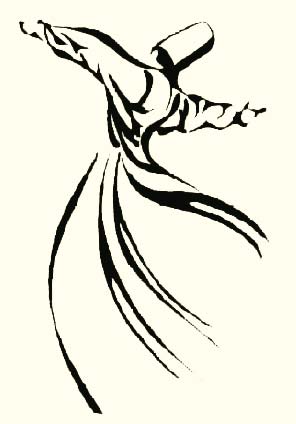|
A multi-national audience crowded into the largest auditorium in North York, to look, see, hear and feel the music from the other side of the world. The hushed excitement in reverent anticipation of the evening’s offerings was nearly tangible. The Jerrahi Sufi Order of Canada along with the Turkish Ministry of Culture and Tourism, presented Ahmet Ozhan & Orchestra with Whirling Dirvishes in their production “Whirling into Peace”. It was held as a fundraiser to facilitate the extension of services to those in need.
This carefully orchestrated program had mass appeal with people reportedly travelling from as far away as Chicago and New York to attend. While awaiting the start of the program, double screen images were displayed of the spectacular and varied landscapes of Turkey, including silhouettes of Istanbul with its famous mosques, beautiful seaside vistas and fairy chimneys — natural conical structures which were often carved out to house families.
|
|
A warm welcome was given to the audience in multiple languages by Canadian filmmaker, actress, director and producer and the evening’s Master of Ceremonies, Tina Petrova. This year marks the 800th birthday anniversary of poet Rumi, born 1207 and UNESCO has declared this year the “International Year of Rumi”.
Mevlana Rumi, born near what is today called Afghanistan, moved to the central region of Turkey, Konya, in 1244, where he came under the tutelage of a wandering dervish, Tebrizi. Rumi dedicated his life to the practise of Sufism and wrote poetry which has only grown in popularity over the last eight centuries and has been used as the lyrics for countless spiritual songs. Followers of Mevlana became known as Mevlevis or Whirling Dervishes, their whirling being a type of meditation in order to reach spiritual perfection. Watchers of the dance are believed to receive God’s gift of love.
This performance marked Canada’s participation in the international Rumi celebration as evidenced by the attendance of several political leaders. Mr. James George, a former Canadian diplomat to the Middle East, spoke of Canada’s commitment to multi-culturalism in a brief speech given from the audience.
|
|
 |
|
|
Poetry and music were next on the program. The Khadiri Ensemble performed devotional music and then, singing a cappella, a member of a local family Sufi choir with no name but ties to the Caribbean, gave the call of the Muezzin, a calling of the Faithful to prayer. In a haunting and beautiful voice with a perfectly controlled vibrato for some sustained notes and a pure unwavering and lengthy sustaining for others, Isa took our minds and spirits back across the ages. In my experience, the beauty of this ‘song’ as well as this particular performance, is unequalled, anywhere.
As a choir, this family group performed two works, the first of which was positively transcendent with three of the six members acting as vocal percussionists singing a cappella. Their voices were perfectly blended and they gave new meaning to the word resonance.
Rumi’s poetry was written in Farsi, the language of the Persians which was later used for cultural endeavours by the Ottomans. “Without You” was read in the original language by Shiraz Sheikh, a Ph.D. student in Middle Eastern Studies at the University of Toronto. Giving the English translation in a lyrical and meaningful way was Tasneem Hirji. Of particular note was the poem “The Reed Flute” read in Farsi by Ali Galestan to background music of the reed flute. It was also translated into English.
Then came American folk singer, Jerry Foreman, who sang several works with his guitar and the poetry of Yunus Emre, a Turkish poet and younger contemporary of Rumi, who wrote poetry in Turkish for the common man.
During the intermission, I met a group of four Sufis from two different Canadian sects, which follow two different masters. Their beliefs are similar but their practise of remembrance differs.
So what is Sufi-ism? Well, that is not so easily answered but their mystical practise and set of beliefs are thought to predate Islam and have traditional components of Buddhism and Hinduism, having found a home in both the Shiite and Sunni Islamic streams around the twelfth century. The word’s etymology is unclear: Arabic meaning wool, referring to the simple cloaks the early Muslims wore; from the Greek Sophia meaning wisdom; or from Persian, Kurdish or Turkish origins meaning purity. While no single definition can be agreed upon, dedication to Divine Love, truth, purity, self-awareness and cultivation of the heart are fundamental to all the sects.
After the intermission, the star performer Ahmet Ozhan took the stage with his eight-piece ensemble, to loud applause. A former pop singer and film star during the 1970s in Turkey, Ozhan studied classical Middle Eastern vocal techniques and has now gained an international reputation for his sacred songs of Rumi, delivered in a quasi-classical, cum folk, cum popular style. He really ‘sells’ the poetry.
The Turkish have a saying that ‘Music is food for the soul.’ The Whirling Dervishes embrace this sentiment through whirling to music. As always, they left the audience including myself, both entranced and enchanted as they whirled to Ozhan’s music. Their rhythmical whirling in one spot with their eyes downcast, one hand uplifted to God, the other hand pointing downward to the earth, creates a kind of ecstasy within the dervish through their whirling motion and spiritual meditation.
|
 |
|
When we Westerners think of classical music, we tend to think only in terms of Western Classical based on the diatonic scale. Turkish Classical music is a unique combination of both the Western and Oriental styles. Tasavvuf is Turkish classical spiritual music. The Turkish types of instruments played by the eight orchestral members were: two drums known as Kudum and Bendir (floor and hand drums), two string instruments, Tanbur and Keman, and two kinds of lutes or uds, the Kemence and Rebab. In combination, the beautiful and to the Western ear sometimes eerie music, is complicated even without the use of harmony.
You may think you have listened to and acquired a taste for all kinds of music but if you haven’t heard the ‘live’ prayer of the Muezzein calling the Faithful to prayer, or heard some of the songs of the over 70,000 verses written by Turkish/Persian/Afghani mystical poet Mevlana Jelaluddin Rumi, as Al Jolson once said, “Baby, you ain’t (heard) nothing yet.”
|
|



